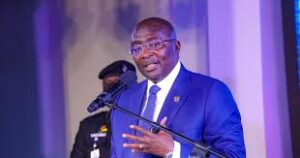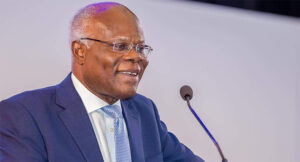Bawumia: BoG, IMF, and NDC Bigwigs Now Agree With Me
Former Vice President Dr. Mahamudu Bawumia says he feels vindicated as several of the economic initiatives he championed while in office are now receiving widespread recognition—even from institutions and individuals who previously questioned or criticised his policies.
Speaking to supporters of the New Patriotic Party (NPP) on Thursday, August 28, after filing his nomination to contest the party’s presidential primaries, Dr. Bawumia said recent acknowledgements by the Bank of Ghana (BoG), the International Monetary Fund (IMF), and leading figures within the opposition National Democratic Congress (NDC) confirm the soundness of his economic strategies.
“Every criticism, every attack—I’ve heard it all,” he told party faithful. “But the passage of time has proven many of my policy positions to be correct. Today, even the Bank of Ghana, the IMF, and notable members of the NDC admit that I was right on many issues. So I ask—what else is there to say?”
His comments come in the wake of remarks by the First Deputy Governor of the BoG, Dr. Zakari Mumuni, who recently praised the Central Bank’s Gold Purchase Programme for stabilising the Ghanaian cedi and helping to bring inflation under control. Speaking at CNVERGE’25, a major trade banking forum held in London, Dr. Mumuni noted that the programme has significantly contributed to a more stable macroeconomic environment and improved investor confidence.
BoG Gold Policy Earns International Praise
The BoG’s Gold Purchase Programme, introduced in June 2021, was designed to strengthen Ghana’s foreign reserves and reduce the economy’s dependence on the US dollar. Under this initiative, the Central Bank purchases gold from licensed local mining companies using cedis. This allows the country to retain more of its foreign currency and protect itself from fluctuations in international currency markets.
According to the BoG, Ghana’s gold reserves stood at 34.40 tonnes as of July 2025—evidence of the programme’s continued success. Dr. Mumuni credited the initiative with contributing to Ghana’s recent sovereign credit upgrade from “restrictive default” to “B- with a stable outlook” in June 2025, helping to rebuild international investor trust in the economy.
Foundation for Gold-for-Oil Scheme
Dr. Mumuni also highlighted that the Gold Purchase Programme laid the groundwork for the government’s innovative Gold for Oil initiative, which allows Ghana to exchange gold directly for petroleum products. This arrangement helps the country avoid using scarce foreign reserves to import fuel, easing pressure on the forex market.
The scheme has helped Ghana secure petroleum supplies at competitive rates and stabilise domestic fuel prices, which in turn has led to a moderation in inflation and a reduction in transportation costs. These improvements, Dr. Mumuni noted, are contributing factors to the country’s emerging economic recovery.
Even Critics Concede Success
For Dr. Bawumia, the current recognition from technocrats, economists, and even political opponents marks a turning point in public perception of his leadership. For years, he faced sharp criticism over Ghana’s economic trajectory, especially during difficult fiscal periods. However, recent acknowledgements suggest that some of his most ambitious policies are now being seen in a new light.
He cited these endorsements as proof that visionary leadership may not always be appreciated in the moment—but with time, results speak for themselves.
“As we look back, many realise that these were not just ideas—they were solutions. And now the benefits are unfolding for all to see,” he told supporters.
Positioning for Leadership
As Dr. Bawumia campaigns to become the NPP’s presidential candidate for the 2026 general elections, he is leaning heavily on his economic record as Vice President. He is positioning himself as a leader with both the foresight and the policy experience to guide Ghana through complex economic challenges.
With endorsements—direct or implied—coming from institutions such as the BoG, the IMF, and even some within the opposition, his campaign narrative is focused on credibility, competence, and long-term impact.







